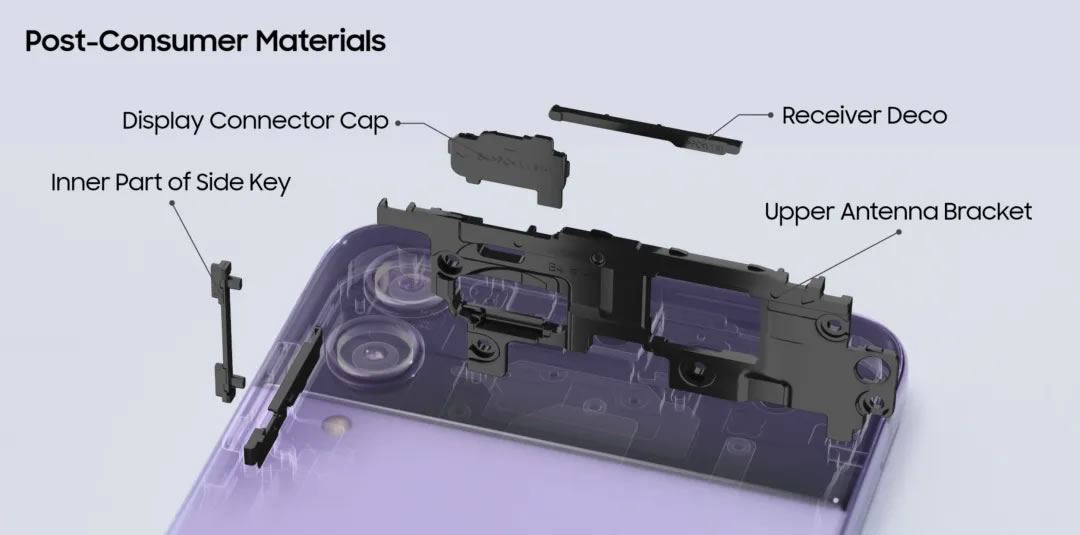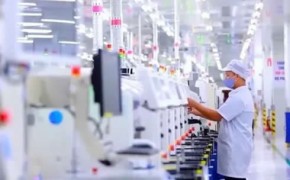近日越南三星在旭日大数据更新了全球绿色采购项目,进一步加大了对供应链企业在可持续发展循环经济上支持力度。(附:越南三星最新绿色采购项目更新内容)
作为三星全球绿色采购的重要部分,充分利用环境中的可回收利用的废旧物品,导入到产品生产的供应链里面,是三星领先全球科技企业的一大特点。

与大多数科技企业,仅停留在自己的供应链生态体系内进行材料循环再利用不同,三星除了鼓励供应商在进行材料选型时,优先选择可循环再利用的材料外,还引导供应链企业从更广泛的生活环境中回收循环所有的可利用废旧物品,包括废旧塑料、生物质纤维、拆解遗弃的金属矿物等等,如海滩回收的渔网、冲浪板、废旧金属围栏,以及由植物或植物废物制成的墨水、涂料,循环再利用的胶带,植物、水果、废物制成的生物纤维纯素皮革之类,做到了真正打破产业边界,推动全社会参与到可持续发展的循环经济中来。
三星的全球绿色采购计划是该公司对可持续发展和环境责任的更广泛承诺的一部分。该计划的重点是促进环保材料的使用,并确保整个供应链遵守对环境负责的做法。
其中三星优先在其产品中使用可回收和可持续材料。该公司正在努力增加其设备中环保材料的比例,包括使用再生塑料、生物塑料和其他可持续替代品。
除此之外,三星还与供应商密切合作,确保他们符合严格的环境标准。这包括定期进行审计和评估,以验证是否符合环境法规和三星自己的绿色采购指南。
同时三星致力于最大限度地减少其产品中有害物质的使用。该公司已为供应商制定了减少或消除某些有害化学品和材料使用的指导方针。计划还侧重于减少整个供应链中的废物,三星与供应商合作实施减少废物产生并促进材料回收和再利用的做法。
除了让供应链企业广泛参与外,三星也与国际组织和行业团体合作,在全球范围内推广绿色采购实践,积极参与旨在为可持续采购制定全行业标准的计划。
三星早在1992年就发布了“三星环境宣言”, 2021年就发布了“GalaxyforthePlanet”可持续发展计划,在确保品质和体验的前提下,极大程度地降低智能设备生命周期内的碳足迹。到2022年发布新环境战略,颁布“四减少一扩大”措施,三星将绿色环保理念深刻融入公司经营的全流程中。
三星深入研究产品设计、物流、分销、回收的全流程中可能对环境产品的影响,不断开发更加绿色节能的产品。特别是在材料方面,三星尽可能选择可回收材料。比如三星Galaxy S24系列手机的塑料部分,使用从废弃渔网、水桶和PET瓶中的回收材料制成;扬声器部分则使用了40%以上的回收钢,包装盒部分则使用了100%回收纸。三星正利用这些可再生资源,构建可持续发展的新型道路。
目前三星的消费电子产品上,通过对废弃渔网、再生铝材和玻璃,以及水桶、PET瓶等再生材料的应用,将时尚、耐用和环保的理念融合在产品的绿色设计中,另外还纳入了再生钴、再生稀土元素、再生钢材和热塑性聚氨酯(TPU)材料,进一步扩大了可持续设计的范畴,这些可再生材料都可以在Galaxy移动产品(包括智能手机、平板电脑、个人电脑和可穿戴设备等)中找到。
为了提升越南三星的绿色制造能力,越南三星正在推动越南本土的绿色采购,寻找有能力提供消费电子产品回收金属、回收塑料、回收纺织品等原料的零组件环保制造供应商与产能,有能力提供家电产品回收金属、回收塑料回收纺织品等原料的零组件环保制造供应商与产能,希望有能力提供废弃植物纤维、合成生物纤维、合成生物蛋白质等生物质环保创新材料产品企业,为三星研发出更多的创新科技原材料、量产工艺,并提供产成品产能配套服务。
三星也对旭日大数据表示,将通过其领先的AI技术,助力供应链企业提升环保回收材料、再生材料、环保生物合成材料的技术进步与产品研发,使用生态意识材料共创环保产品,进一步推动消费电子与家电产品的绿色升级,一起在未来发展成为可持续性企业,打造环境友好型三星生态链,助力全球制造业绿色低碳发展。
三星将这些可利用资源转化为高性能优化的材料,以维护三星最先进的循环设计和高质量标准,构建可持续发展的新型道路。因此,作为2050 年实现碳中和的核心计划组成部分,三星通过负责任的资源管理政策,打破产业生态边界,在可持续发展道路上,不断为循环经济做出贡献。
附:越南三星最新绿色采购项目更新内容

As an important part of Samsung's global green procurement, it is a major feature of Samsung's leading global technology company to make full use of recyclable waste items in the environment and introduce them into the supply chain of product production.
Unlike most technology companies, which only stay in their own supply chain ecosystem for material recycling, Samsung not only encourages suppliers to give priority to recyclable materials when selecting materials, but also guides supply chain companies to recycle all reusable waste items from a wider living environment, including waste plastics, biomass fibers, dismantling abandoned metal minerals, etc., such as beach recycled fishing nets, surfboards, scrap metal fences, and inks and paints made from plants or plant waste. Recycled tapes, bio-cellulose vegan leather made from plants, fruits, and waste products have truly broken industrial boundaries and promoted the participation of the whole society in a sustainable circular economy.
Samsung's global green procurement program is part of the company's broader commitment to sustainability and environmental responsibility. The program focuses on promoting the use of eco-friendly materials and ensuring that environmentally responsible practices are adhered to throughout the supply chain.
Among them, Samsung prioritizes the use of recycled and sustainable materials in its products. The company is working to increase the proportion of environmentally friendly materials in its equipment, including the use of recycled plastics, bioplastics, and other sustainable alternatives.
In addition to this, Samsung works closely with suppliers to ensure that they meet strict environmental standards. This includes regular audits and assessments to verify compliance with environmental regulations and Samsung's own green procurement guidelines.
At the same time, Samsung is committed to minimizing the use of hazardous substances in its products. The company has developed guidelines for suppliers to reduce or eliminate the use of certain hazardous chemicals and materials. The program also focuses on reducing waste throughout the supply chain, with Samsung working with suppliers to implement practices that reduce waste generation and promote material recycling and reuse.
In addition to engaging a wide range of supply chain companies, Samsung also collaborates with international organizations and industry groups to promote green procurement practices globally, actively participating in initiatives aimed at setting industry-wide standards for sustainable procurement.
Samsung released the "Samsung Environmental Declaration" as early as 1992, and in 2021, it released the "GalaxyforthePlanet" sustainability program to greatly reduce the carbon footprint of smart devices during their life cycle while ensuring quality and experience. By 2022, Samsung will release a new environmental strategy and promulgate "four reductions and one expansion" measures, and Samsung will deeply integrate the concept of green environmental protection into the entire process of the company's operation.
Samsung is deeply researching the possible impact on environmental products in the entire process of product design, logistics, distribution, and recycling, and is continuously developing more energy-efficient products. Especially when it comes to materials, Samsung chooses recyclable materials wherever possible. For example, the plastic part of the Samsung Galaxy S24 series is made from recycled materials from discarded fishing nets, buckets and PET bottles. More than 40% recycled steel is used for the speakers, and 100% recycled paper is used for the boxes. Samsung is using these renewable resources to build a new path to sustainability.
At present, Samsung's consumer electronics products have integrated the concepts of fashion, durability and environmental protection into the green design of products through the application of recycled materials such as discarded fishing nets, recycled aluminum and glass, as well as buckets and PET bottles, and also included recycled cobalt, recycled rare earth elements, recycled steel and thermoplastic polyurethane (TPU) materials, further expanding the scope of sustainable design. tablets, PCs, and wearables, etc.).
In order to enhance the green manufacturing capacity of Samsung Viet Nam, Samsung Viet Nam is promoting green procurement in Viet Nam, looking for environmentally friendly manufacturing suppliers and production capacity of components that have the ability to provide recycled metals, recycled plastics, recycled textiles and other raw materials for consumer electronics, and environmentally friendly manufacturing suppliers and production capacity of components that have the ability to provide recycled metals for household appliances, recycled plastics and recycled textiles and other raw materials, hoping to provide enterprises with biomass environmentally friendly innovative material products such as waste plant fibers, synthetic biological fibers, and synthetic biological proteins. We have developed more innovative technology raw materials and mass production processes for Samsung, and provided supporting services for finished product production capacity.
Samsung also told Glorious Sun Big Data that it will help supply chain enterprises improve the technological progress and product research and development of environmentally friendly recycled materials, recycled materials, and environmentally friendly biosynthetic materials through its leading AI technology, use eco-conscious materials to create environmentally friendly products, further promote the green upgrade of consumer electronics and home appliances, and develop into a sustainable enterprise in the future, create an environmentally friendly Samsung ecological chain, and help the green and low-carbon development of the global manufacturing industry.
Samsung transforms these available resources into high-performance, optimized materials to maintain Samsung's state-of-the-art circular design and high quality standards to build a new path to sustainability. Therefore, as part of its core plan to achieve carbon neutrality by 2050, Samsung continues to contribute to the circular economy on the path of sustainable development by breaking down industrial ecological boundaries through responsible resource management policies.




